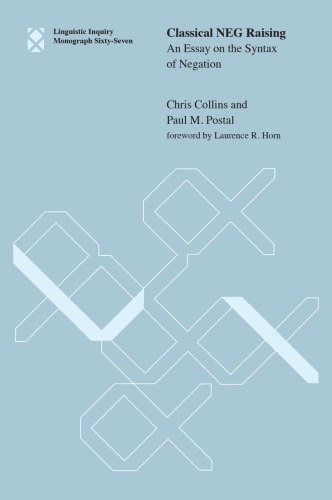

Most ebook files are in PDF format, so you can easily read them using various software such as Foxit Reader or directly on the Google Chrome browser.
Some ebook files are released by publishers in other formats such as .awz, .mobi, .epub, .fb2, etc. You may need to install specific software to read these formats on mobile/PC, such as Calibre.
Please read the tutorial at this link. https://ebooknice.com/page/post?id=faq
We offer FREE conversion to the popular formats you request; however, this may take some time. Therefore, right after payment, please email us, and we will try to provide the service as quickly as possible.
For some exceptional file formats or broken links (if any), please refrain from opening any disputes. Instead, email us first, and we will try to assist within a maximum of 6 hours.
EbookNice Team

Status:
Available4.6
11 reviewsIn this book, Chris Collins and Paul Postal consider examples such the one below on the interpretation where Nancy thinks that this course is not interesting: Nancy doesn't think this course is interesting.
They argue such examples instantiate a kind of syntactic raising that they term Classical NEG Raising. This involves the raising of a NEG (negation) from the embedded clause to the matrix clause. Collins and Postal develop three main arguments to support their claim. First, they show that Classical NEG Raising obeys island constraints. Second, they document that a syntactic raising analysis predicts both the grammaticality and particular properties of what they term Horn clauses (named for Laurence Horn, who discovered them). Finally, they argue that the properties of certain parenthetical structures strongly support the syntactic character of Classical NEG Raising.
Collins and Postal also offer a detailed analysis of the main argument in the literature against a syntactic raising analysis (which they call the Composed Quantifier Argument). They show that the facts appealed to in this argument not only fail to conflict with their approach but actually support a syntactic view. In the course of their argument, Collins and Postal touch on a variety of related topics, including the syntax of negative polarity items, the status of sequential negation, and the scope of negative quantifiers.